|
|
 NOTICIAS
Final Dibanet Newsletter
 This edition of the newsletter provides you with summary of the achievement within the DIBANET projects.
The last project meeting was combined with a Networking event in Thessaloniki where they key results and future plans were presented. Several promising results have been achieved in the last years starting from rapid analytical tools to predict composition of biomass to chemical databases.
You can find brief descriptions of the key results in this newsletter. Download »More information » |
~~~~~
PETROBRAS has joined the DIABNET consortium
 PETROBRAS, a major Brazilian energy corporation that produces enough oil to meet the needs of Brazil, has shown increasing interest in recent years in the production of sustainable biofuels and chemicals. The Company, which has been collaborating with Prof. Victor Teixeira da Silva, a researcher at DIBANET partner UFRJ, for some time, became interested in the DIBANET project during the Summer School and Networking Event, organised by Prof.Teixeira for the project, in Rio de Janeiro in 2010.
DIBANET project leader Prof. Michael Hayes, from the Carbolea Biomass Research Group at the University of Limerick, remarked that: "The addition of PETROBRAS to the DIBANET consortium is a significant event and a great reflection of the progress that has been achieved in the project. PETROBRAS will be of immense help in allowing us to determine the most appropriate ways to advance towards the commercialisation of the advanced processes that we have developed over the past three years".
|
~~~~~
Networking event: videos are available online!
 Videos recorded on the DIBANET & SMARt CHP Networking event held in Thessaloniki, Greece on 31 October 2012 are available online. More information » |
~~~~~
Award for the scientific and technological outstanding academic in research
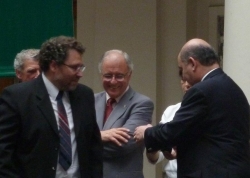 Dr. Gustavo Romanelli, a researcher of DIBANET research team, recently received from the University of La Plata (Argentina) the "Award for the scientific and technological outstanding academic in research".
He was honored for the contributions made in science and technology, the production of new knowledge for the consolidation of higher education and human resource training. |
~~~~~
Networking event: presentations and posters are available online!
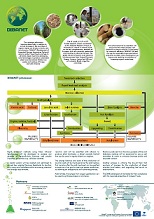 The presentations and posters on the DIBANET processes and project results as well as on the SMARt CHP project are available at the Event site: http://www.dibanet.org/networking_day_greece.php More information » |
~~~~~
Prof. Tony Bridgwater from ASTON University wins Clean Energy Award

Tony Bridgwater, Professor of Chemical Engineering at ASTON University, working on the Dibanet project, has been awarded the 'UK Environmental Capital Peterborough Clean Energy' Award. This award recognises outstanding contributions to the development, implementation and promotion of clean energy technologies.
Tony Bridgwater has been pioneering the development of thermal biomass conversion and second generation biofuel technologies for over 30 years. Professor Bridgwater’s name has been closely attached to 'Fast Pyrolysis', a new technology to transform biomass to liquid through thermochemical conversion. More information » |
~~~~~
DIBANET Chemical database
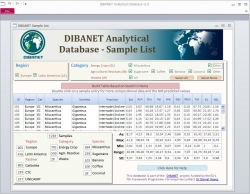
You can access the DIBANET Chemical Database with information on the lignocellulosic, elemental and moisture contents of selected energy crops (e.g. Miscanthus), agricultural residues (e.g. from sugarcane, coffee, banana and coconut) and wastes of Europe and Latin America as well as on their predicted yields from biorefining technologies.
These technologies consist of, for instance, dilute acid and enzymatic hydrolysis of biomass, synthesis of mixed alcohols via catalytic processing of syngas derived from gasification of biomass, and Fischer-Tropsch synthesis of mixed range of linear hydrocarbons from biomass-derived syngas.
You can access the database on the following link: http://www.dibanet.org/chemicaldatabase.php
|
~~~~~
DIBANET Networking event on 2G biodiesel production
10/31/2012 - 10/31/2012
 Application is open for the DIBANET Networking day which brings together key players in scientific communities and industry to discuss how Europe and Latin America can work together to produce diesel fuels sustainably and cheaply.
The Networking event will be a pre-session for the “UBIOCHEM-III: Sustainable production of fuels/energy, materials & chemicals from biomass”, the third International Workshop of COST Action CM0903, (1-3 November 2012) which is organized jointly by the Chemical Process Engineering Research Institute of the Centre for Research & Technology Hellas (CPERI/CERTH) and the Departments of Chemical Engineering and Chemistry of Aristotle University of Thessaloniki (AUTH).
The participation is free of charge, however, registration is required.
Event poster More information » |
~~~~~
Dibanet Newsletter
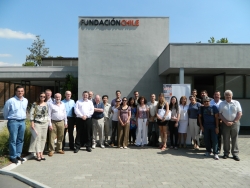 The latest edition of the newsletter provides you with updated results and outcomes of the DIBANET project.
The consortium met last time in Santiago de Chile in January 2012 where the current and future project activities and their potential outcomes were discussed. The project will finish at the end of 2012. Several promising results have been achieved in the last years that will be presented on the DIBANET Networking Day on 31 October 2012.
Download » |
~~~~~
Free e-learning courses on diesel production from wastes and residues
 Two e-learning courses have been launched in the frame of the project on hydrolysis and thermal processing of biomass for second generation biofuel production. The courses provide general introduction to biofuels, current state and challenges of production processes as well as the chemical description of DIBANET processes (acid hydrolysis, pyrolysis, gasification and upgrading).
The courses are available on the following link: http://www.dibanet.org/elearning.php More information » |
~~~~~
Catalytic upgrading of levulinic acid to ethyl levulinate using reusable silica-included Wells-Dawson heteropolyacid as catalyst Gustavo Pasquale, Patricia Vazquez, Gustavo Romanelli, Graciela Baronetti
 The article on catalytic upgrading of levulinic acid has recently published in Catalysis Communications 18 (2012) 115–120. The work was performed within the DIBANET Network, a project within the European Community’s Seventh Framework Programme (FP7/2007-2013).
ABSTRACT:
In this paper we report, for the first time, the direct incorporation of a heteropolyacid (HPA) withWells-Dawson structure during the synthesis of silica by the sol–gel technique, in acidic media, using tetraethyl orthosilicate. The catalyst characterization was carried out by 31PMAS-NMR, FT-IR, XRD,N2 adsorption–desorption measurements, and the acidic properties were determined through potentiometric titration with n-butylamine. The synthesized catalysts were used in the esterification of levulinic acid with ethanol, at 78 °C, to obtain ethyl levulinate. The synthesis of silica-included HPAs was satisfactory, and the samples kept their HPA structure intact after synthesis. The catalytic tests for the esterification reaction between levulinic acid and ethanol to produce ethyl levulinate have shown that the silica-included Wells-Dawson HPA is an active and selective catalyst for this reaction. It must be noted that silica-included HPAs also kept their structure and catalytic activity after three consecutive reaction cycles. These results indicated that these solid acids are promissory catalysts for the esterification reaction of levulinic acid and ethanol to ethyl levulinate. |
~~~~~
Levulinic acid esterification with ethanol to ethyl levulinate production over solid acid catalysts D.R. Fernandesa, A.S. Rochaa, E.F. Maia, Claudio J.A. Motab, V. Teixeira da Silva
 An article has recently published on Applied Catalysis. The work was performed within the DIBANET Network, a project within the European Community’s Seventh Framework Programme (FP7/2007-2013).
Abstract
Levulinic acid is considered as a versatile building block because it can be used for the synthesis of several organic chemicals. In particular, its esterification with ethanol produces ethyl levulinate that can be used as diesel miscible biofuel (DMB), preventing global warming by decreasing atmospheric CO2 generated from the consumption of fossil fuels. This article explores the use of two groups of solid acid catalysts (sulfated oxides and zeolites with different pore structures) in the esterification of levulinc acid with ethanol aiming for ethyl levulinate production. It was found that while there is a correlation between the number of acidic sites and activity for the sulfated oxides, the same is not true for the studied zeolites where the pore channels play a more important role. Among the catalysts tested, Amberlyst-15 and sulfated SnO2 showed a remarkable high yield of ethyl levulinate that was probably due to the strong acidity provided by SO3H functional groups and SO4 species, respectively.
The whole artical is available © 2012 Elsevier B.V. Applied Catalysis A: General 425– 426 (2012) 199– 204. |
~~~~~
Brazil and UK knowledge exchange: catalytic pyrolysis
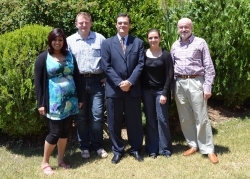 Professor Victor Teixeira of the Federal University of Rio de Janeiro (centre) with members of Aston University Bioenergy Research Group (from left to right: Manisha Patel, Daniel Nowakowski, Ana Cortes, Professor Tony Bridgwater).
In November 2011, Professor Tony Bridgwater of Aston University Bioenergy Research Group in the UK will be hosting Professor Victor Teixeira from the Federal University of Rio de Janeiro, Brazil.
The one-month visit will be funded by the UK’s Royal Academy of Engineering, as part of its Distinguished Visiting Fellowship Scheme, which encourages the exchange of knowledge and experiences between UK institutions and international eminent experts.
Currently Aston University Bioenergy Research Group (BERG) and the Nucleus of Catalysis group at the Federal University of Rio de Janeiro (UFRJ) are working in collaboration on upgrading primary vapours and liquid products from fast pyrolysis of biomass into higher quality products for use as transport fuels and chemicals within the EC sponsored DIBANET project. This involves production of catalysts in UFRJ and testing at Aston University, but does not provide hands-on experience of how catalysts perform in a fast pyrolysis process. BERG has a global reputation in biomass fast pyrolysis but is short of increasingly important catalyst production expertise to meet requirements for biofuels, while UFRJ has an international reputation in developing new catalysts but lacks fast pyrolysis processing units.
The aim of Professor Teixeira’s forthcoming visit to the UK is to allow him to test his catalysts in action. This will improve the understanding of how to design and manufacture improved catalysts for upgrading fast pyrolysis vapours and liquids and better understand how to integrate catalysts into fast pyrolysis. This work aims to overcome the limitations of work conducted to date by using new catalysts and multi-stage processing, and will provide a unique opportunity to test the new catalysts on the primary vapour and liquid products from fast pyrolysis in Aston’s laboratory. Consideration will also be given to secondary catalytic upgrading to create a more focussed multistage process analogous to conventional refining.
Brazil already has a well established biofuel industry with substantial production of bioethanol. The recent discovery of oil reserves will refocus its interest onto the much higher energy density hydrocarbon fuels, and the outcomes from this project will be of considerable potential interest to the Brazilian petroleum and petrochemical industry. Similarly, the potential new and improved processes to be identified during Professor Teixeira’s visit to Aston University will help to give the UK a leading edge in renewable energy as well as enabling technology transfer to Brazil. |
~~~~~
DIBANET Catalist Workshop in Limerick, Ireland
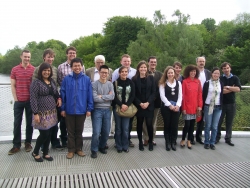 Members of the DIBANET research project team from Europe and Latin America recently came together for a two day research workshop hosted by the Carbolea Research at the University of Limerick, coordinators of the FP7 funded project.
The purpose of the workshop was to discuss progress in the development of the DIBANET process, with a heavy emphasis on the role of catalysis in the production of diesel miscible biofuels from European and Latin American feedstocks.
Acid hydrolysis of biomass feedstocks for the production of levulinic acid is being carried out in the DIBANET reactor system at the University of Limerick. Promising results from the development of a pre-treatment to reduce the recalcitrance of biomass, resulting in an improvement in the hydrolysis yields were discussed. A pre-treatment system utilising catalysts developed by UBA was also examined.
Latin American partner UFRJ are undertaking catalytic esterification reactions of levulinc acid and ethanol to produce ethyl levulinate and upgrading of bio-oil using catalysts developed in-house and by UBA.
The residual materials from the hyrdrolysis process are being examined by UK partner Aston University for their potential as a feedstock for pyrolysis to produce bio-oil. CERTH from Greece are investigating the role that catalysts can play in improving the yield of bio-oil from the pyrolysis of the acid hydrolysis residues. |
~~~~~
The new edition of the DIBANET Newsletter is available
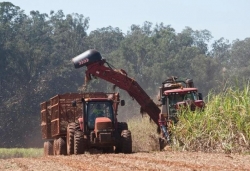 The newest edition of DIBANET Newsletter is now available here with the summary of the DIBANET Networking Day and Summer School held in Rio de Janeiro as well as with the current project activities and results. Download » |
~~~~~
The DIBANET Networking Day presentations are available
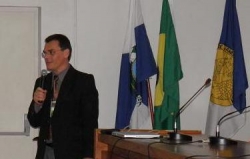 The presentations of the Networking Day Diesel fuels from wastes, residues and non-food crops of Latin America & Europe are now available:
The presentations cover the following themes:
- Latin American and European feedstocks for diesel fuel
production
- Technologies for sustainable diesel fuel production and
their products
- Catalysis in diesel fuel production
- Newly developed analytical techniques for online
feedstock characterisation More information » |
~~~~~
Governor of Iowa attended the DIBANET Networking Day
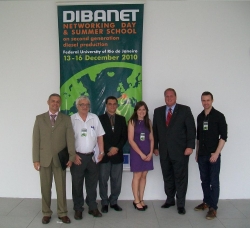 Mr. Chet Culver, Governor of Iowa and representative of the Governors Biofuel Coalition in the United States, presented the latest developments in biofuels and biomass in Iowa. These developments are driven by the Iowa Power Fund, which was created to be a tool to promote the energy independence for Iowa.
”This fund has seen Iowa’s renewable energy grow from 5% to 20% of the energy sector in a short space of time. Biofuels currently have an 8 billion dollar impact on Iowa’s economy, which has generated 2 billion dollars in new household income and created and supported 50,000 Iowa jobs” said Prof. Michael H.B. Hayes, UL, coordinator of DIBANET. “If such a fund was made available in other countries to support and develop green technologies like DIBANET, not only would it ensure energy security but it would drive the Green economy and deliver much needed sustainable, green jobs.” More information » |
~~~~~
DIBANET's research student wins the Young Scientist Presidential Award
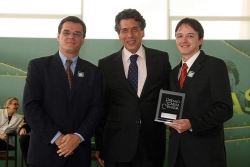 Prof. Victor Teixeira da Silva-UFRJ, Mr. Luiz Antonio Rodrigues Elias (Minister of Science and Technology), Mr. Leandro Alves de Sousa, pictured at the award ceremony
Mr. Leandro Alves de Sousa, a PhD student working in the DIBANET research team under the supervision of Prof. Victor Teixeira da Silva at the Federal University of Rio de Janeiro, recently received the Young Scientist Presidential Award in Brazil for his catalysis work which is a major theme of DIBANET research. |
~~~~~
Summer School
 Applications are now being accepted for the DIBANET Summer School. The event is aimed at providing in-depth information on technologies for the sustainable production of second generation diesel fuels. The DIBANET Summer School is being organised in conjunction with the Federal University of Rio de Janeiro.
The School is designed for postgraduate students (Masters and PhD) in Chemistry and Chemical Engineering, typically in their first or second years of research, who would like to engage together in the examination of technologies for the sustainable production of second generation diesel fuels, chemicals and biochars from the wastes, residues and non-food crops of Latin America and Europe. Download »More information » |
~~~~~
Networking Day
 Applications are now being accepted for the DIBANET Networking day which bring together key players in scientific communities and industry to discuss how Europe and Latin America can work together to produce diesel fuels sustainably and cheaply. Download »More information » |
~~~~~
DIBANET Newsletter 2
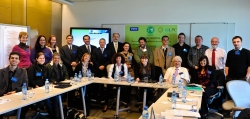 The 2nd edition of DIBANET Newsletter is now available here with the current project results other interesting details. Download » |
~~~~~
DIBANET Newsletter 1
 The first DIBANET Newsletter was published in March 2010. Download » |
~~~~~
SCHOOL OF ENGINEERING AND APPLIED SCIENCE
 PhD Studentship - Biomass pyrolysis and upgrading
Applications are invited for a three year PhD studentship, supported by the European Commission through the DIBANET project to be undertaken within the Bioenergy Research Group (BERG) in Chemical Engineering and Applied Chemistry at Aston University. BERG is a founder member of the European Bioenergy Research Institute at Aston. The successful applicant will join an established experimental group working on biomass fast pyrolysis. Download »More information » |
~~~~~
|







































